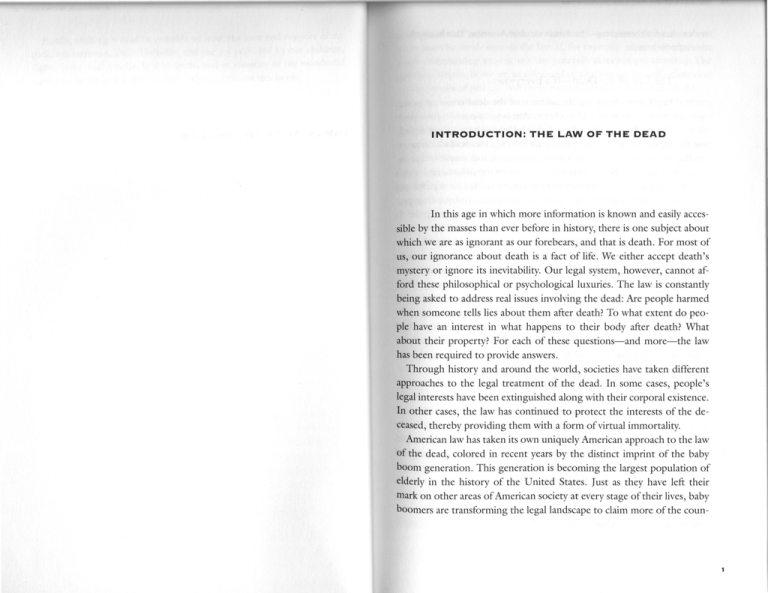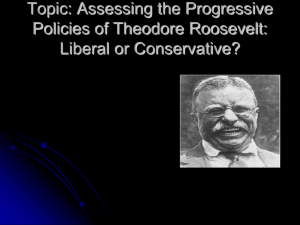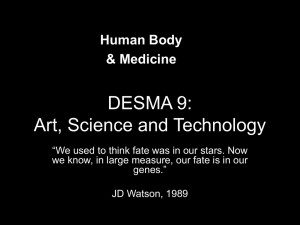In this age in which more information is known... y the masses than ever before in history, there... sible b
advertisement

INTRODUCTION : THE L AW O F TH E DEAD In this age in which more information is known and easily accessible by the masses than ever before in history, there is one subject about which we are as ignorant as our forebears, and that is death. For most of us, our ignorance about death is a fact of life. We either accept death's mystery or ignore its inevitability. Our legal system, however, cannot afford these philosophical or psychological luxuries. The law is constantly being asked to address real issues involving the dead: Are people harmed when someone tells lies about them after death? To what extent do people have an interest in what happens to their body after death? What about their property? For each of these questions-and more-the law has been required to provide answers. Through history and around the world, societies have taken different approaches to the legal treatment of the dead. In some cases, people's legal interests have been extinguished along with their corporal existence. In other cases, the law has continued to protect the interests of the deceased, thereby providing them with a form of virtual immortality. American law has taken its own uniquely American approach to the law of the dead, colored in recent years by the distinct imprint of the baby boom generation. This generation is becoming the largest population of elderly in the history of the United States. Just as they have left their mark on other areas of American society at every stage of their lives, baby boomers are transforming the legal landscape to claim more of the coun- 2 INTRODUCTION: THE LAW OF THE DEAD try's riches for themselves-the future dead of America. This book tracks this transformation . The Law of the Dead-It's Everywhere Legal issues involving the interests of the dead come up in surprisingly numerous ways and contexts. Although we most commonly think of the dead as exercising legal rights by leaving instructions regarding the disposition of their property, legal issues of the dead also arise regarding the control of a person's body, reputation, and artistic creations. At one time, dead bodies were primarily something to be buried. Legal questions regarding dead bodies were generally limited to determining who among the living was responsible for interment. Today we are presented with many more options than past generations regarding the final use and disposition of our bodies. This range of possibilities raises many more legal questions. Can people make legally enforceable decisions about whether their body is buried or cremated, dissected for scientific study, harvested for organ transplants, or plasticized for display in traveling exhibits? More issues are raised by reproductive matter. It is now a relatively simple procedure to exhume sperm from a dead man. It may soon be possible to remove viable eggs from dead women. Do people have a legal right to control whether their eggs or sperm are exhumed after death for posthumous child production? If children are posthumously conceived, should they be treated as offspring of the deceased "parent"? Cryonics raises some of the most vexing problems regarding the legal treatment of dead bodies because there is vast disagreement as to its viability. Some people believe that the technology will eventually be available and view cryonics as offering the best opportunity for people finally to be able to transcend death. Others see cryonics as a pipe dream and the cryonics industry as charlatanism at its worst, taking advantage of people at their most vulnerable time of life. Will the law outlaw, tolerate, or encourage cryonics? If allowed, who will decide whether a person's body will be frozen for possible reanimation? If cryonics were to work, would the newly defrosted person be treated as the same person who died or as a new individual? INTRODUCTION: THE LAW OF THE DEAD Reputational interests raise another set of questions. Some aspects of reputation lie firmly outside the law. If, for example, a friend divulges our most embarrassing secrets, the law generally does not get involved. The law does step in, however, to safeguard reputations in cases of defamation and invasions of privacy. Will these protections extend beyond death? A person's artistic creations, name, and image lie somewhere between property and reputational interests. During a person's lifetime, the legal doctrines of copyright, right of publicity, and moral rights allow people to control the exploitation of their works. What about after death? Can artists continue to exert control over what happens to their creations? Through computers, actors' images can be manipulated such that they can continue to star in new movies long after death. Can an actor leave instructions that control the extent that this will be allowed to happen? Even the question regarding control of property at death is knottier then it initially appears. Although American law provides explicit protections for people to be able to transmit their property at death, there is a distinction between directing who receives property and imposing longterm controls over that property. Trusts allow people to leave instructions on the use and disposition of their property. They are commonly established to benefit particular individuals or to promote charitable or other purposes. Their appeal and potential power lies, in part, in the fact that they can be drafted to last long after the lives of the settlor and all the beneficiaries living at the time the trust is created. Yet although the trust mechanism creates the possibility of long-term posthumous control, the law must decide the extent to which this protracted control will be allowed. For example, the law must decide whether there will be time limitations on trusts. Can a person set money aside for his or her great-great-great-great-great grandchildren (expected to be born sometime in the twenty-third century)? In addition to duration, there is the question as to the extent to which the law will allow posthumous meddling by enforcing trust provisions that are designed to encourage (or even coerce) certain behavior by the beneficiaries after the settlor has died. For example, will the courts enforce a trust provision that a beneficiary will inherit only if he or she pursues a particular career or marries someone of the same faith? What if the contingencies of the trust require him or her to practice a particular religion or to refrain from 3 2 INTRODUCTION: THE LAW OF THE DEAD try's riches for themselves-the future dead of America. This book tracks this transformation . The Law of the Dead-It's Everywhere Legal issues involving the interests of the dead come up in surprisingly numerous ways and contexts. Although we most commonly think of the dead as exercising legal rights by leaving instructions regarding the disposition of their property, legal issues of the dead also arise regarding the control of a person's body, reputation, and artistic creations. At one time, dead bodies were primarily something to be buried. Legal questions regarding dead bodies were generally limited to determining who among the living was responsible for interment. Today we are presented with many more options than past generations regarding the final use and disposition of our bodies. This range of possibilities raises many more legal questions. Can people make legally enforceable decisions about whether their body is buried or cremated, dissected for scientific study, harvested for organ transplants, or plasticized for display in traveling exhibits? More issues are raised by reproductive matter. It is now a relatively simple procedure to exhume sperm from a dead man. It may soon be possible to remove viable eggs from dead women. Do people have a legal right to control whether their eggs or sperm are exhumed after death for posthumous child production? If children are posthumously conceived, should they be treated as offspring of the deceased "parent"? Cryonics raises some of the most vexing problems regarding the legal treatment of dead bodies because there is vast disagreement as to its viability. Some people believe that the technology will eventually be available and view cryonics as offering the best opportunity for people finally to be able to transcend death. Others see cryonics as a pipe dream and the cryonics industry as charlatanism at its worst, taking advantage of people at their most vulnerable time of life. Will the law outlaw, tolerate, or encourage cryonics? If allowed, who will decide whether a person's body will be frozen for possible reanimation? If cryonics were to work, would the newly defrosted person be treated as the same person who died or as a new individual? INTRODUCTION: THE LAW OF THE DEAD Reputational interests raise another set of questions. Some aspects of reputation lie firmly outside the law. If, for example, a friend divulges our most embarrassing secrets, the law generally does not get involved. The law does step in, however, to safeguard reputations in cases of defamation and invasions of privacy. Will these protections extend beyond death? A person's artistic creations, name, and image lie somewhere between property and reputational interests. During a person's lifetime, the legal doctrines of copyright, right of publicity, and moral rights allow people to control the exploitation of their works. What about after death? Can artists continue to exert control over what happens to their creations? Through computers, actors' images can be manipulated such that they can continue to star in new movies long after death. Can an actor leave instructions that control the extent that this will be allowed to happen? Even the question regarding control of property at death is knottier then it initially appears. Although American law provides explicit protections for people to be able to transmit their property at death, there is a distinction between directing who receives property and imposing longterm controls over that property. Trusts allow people to leave instructions on the use and disposition of their property. They are commonly established to benefit particular individuals or to promote charitable or other purposes. Their appeal and potential power lies, in part, in the fact that they can be drafted to last long after the lives of the settlor and all the beneficiaries living at the time the trust is created. Yet although the trust mechanism creates the possibility of long-term posthumous control, the law must decide the extent to which this protracted control will be allowed. For example, the law must decide whether there will be time limitations on trusts. Can a person set money aside for his or her great-great-great-great-great grandchildren (expected to be born sometime in the twenty-third century)? In addition to duration, there is the question as to the extent to which the law will allow posthumous meddling by enforcing trust provisions that are designed to encourage (or even coerce) certain behavior by the beneficiaries after the settlor has died. For example, will the courts enforce a trust provision that a beneficiary will inherit only if he or she pursues a particular career or marries someone of the same faith? What if the contingencies of the trust require him or her to practice a particular religion or to refrain from 3 4 INTRODUCTION: THE LAW OF THE DEAD marriage altogether? What if it requires the beneficiary to commit a crime in order to inherit? Trusts also can be used as mechanisms to further particular causes. For example, through a trust a person might direct that his property be used to eradicate diabetes or promote martial arts (or, more perversely, to eradicate martial arts or promote diabetes). Although during life there is essentially no limit on the types of purposes people can support, after death, they are entirely dependent on the law's recognition and enforcement to make these things happen. The law must consider and adopt rules regarding how much latitude it will give people in committing their property to a purpose. Can property be set aside for any purpose at all? Can people order the destruction of their property ("I can't stand the thought of anyone else enjoying my Faberge eggs or Rembrandt paintings")? Can these trusts last forever, or will a time limit be imposed? What happens if the circumstances change and the purpose of the trust no longer makes sense? For each of these questions, and more, the law is called upon for answers. Conceptions of Death and the Law The question of how the law should treat interests of the dead is affected at least in part by our understanding of what it means to be dead. For example, if we believed-as did many who lived in ancient Greecethat the dead must pay a ferryman to be carried across a river to the afterlife, then we would likely find it appropriate for the law to ensure that the dead were buried with worldly goods such as coins (the Greeks stored them in the mouth for safekeeping) so that the deceased would not be left to beg or borrow his or her way to the other side. Alternatively, if we believed that the dead could "see" what was happening among the living (as the afterlife is often depicted in American movies and literature), then we might find it appropriate for the law to continue to provide many of the same protections for the dead that it does for the living so as to not hurt people's feelings.! What if the starting point is-as many people believe-that death marks the end of all conscious existence? This raises the question: If death marks IN TR OD UCTIO N : THE LAW OF THE DEAD the end of conscious existence, shouldn't it also mark the end of legal existence? Societies take this position with respect to voting. No matter how committed people may be to a particular party or candidate during their life, the law does not allow them to cast ballots for elections occurring after their death. The justification for this rule seems self-evident: we are skeptical about people's ability to make good decisions for the future when they are limited in their knowledge to the world of the present. It seems inappropriate, moreover, to give decision-making authority to people who will not be around to enjoy the benefits or suffer the consequences of their decisions. This was an early American value, expressed by no less than Thomas Jefferson, who frequently warned against allowing the wishes of the dead to prevail over those of the living: That our Creator made the earth for the use of the living and not of [the] dead; that those who exist not can have no use nor right in it, no authority or power over it, that one generation of men cannot foreclose or burthen its use to another, which comes to it in its own right and by the same divine beneficence; that a preceding generation cannot bind a succeeding one by its laws or contracts; these are axioms so self evident that no explanations can make them plainer: for he is not to be reasoned with who says that non-existence can control existence or that nothing can move something. 2 And yet today there are many situations where American law, as well as the law of other countries, recognizes interests of the dead, enforces their decisions, and allows them to bind the living. Patterns and Trends in American Law of the Dead The legal issues involving interests of the dead have arisen and developed within different substantive corners of American law, includ. lng torts, property, criminal law, evidence, intellectual property, privacy, and tax. As such, scant attention has been paid to the cumulative picture of the law of the dead, and little effort has gone into understanding its far-reaching implications. 3 By wending our way through these different 5 4 INTRODUCTION: THE LAW OF THE DEAD marriage altogether? What if it requires the beneficiary to commit a crime in order to inherit? Trusts also can be used as mechanisms to further particular causes. For example, through a trust a person might direct that his property be used to eradicate diabetes or promote martial arts (or, more perversely, to eradicate martial arts or promote diabetes). Although during life there is essentially no limit on the types of purposes people can support, after death, they are entirely dependent on the law's recognition and enforcement to make these things happen. The law must consider and adopt rules regarding how much latitude it will give people in committing their property to a purpose. Can property be set aside for any purpose at all? Can people order the destruction of their property ("I can't stand the thought of anyone else enjoying my Faberge eggs or Rembrandt paintings")? Can these trusts last forever, or will a time limit be imposed? What happens if the circumstances change and the purpose of the trust no longer makes sense? For each of these questions, and more, the law is called upon for answers. Conceptions of Death and the Law The question of how the law should treat interests of the dead is affected at least in part by our understanding of what it means to be dead. For example, if we believed-as did many who lived in ancient Greecethat the dead must pay a ferryman to be carried across a river to the afterlife, then we would likely find it appropriate for the law to ensure that the dead were buried with worldly goods such as coins (the Greeks stored them in the mouth for safekeeping) so that the deceased would not be left to beg or borrow his or her way to the other side. Alternatively, if we believed that the dead could "see" what was happening among the living (as the afterlife is often depicted in American movies and literature), then we might find it appropriate for the law to continue to provide many of the same protections for the dead that it does for the living so as to not hurt people's feelings.! What if the starting point is-as many people believe-that death marks the end of all conscious existence? This raises the question: If death marks IN TR OD UCTIO N : THE LAW OF THE DEAD the end of conscious existence, shouldn't it also mark the end of legal existence? Societies take this position with respect to voting. No matter how committed people may be to a particular party or candidate during their life, the law does not allow them to cast ballots for elections occurring after their death. The justification for this rule seems self-evident: we are skeptical about people's ability to make good decisions for the future when they are limited in their knowledge to the world of the present. It seems inappropriate, moreover, to give decision-making authority to people who will not be around to enjoy the benefits or suffer the consequences of their decisions. This was an early American value, expressed by no less than Thomas Jefferson, who frequently warned against allowing the wishes of the dead to prevail over those of the living: That our Creator made the earth for the use of the living and not of [the] dead; that those who exist not can have no use nor right in it, no authority or power over it, that one generation of men cannot foreclose or burthen its use to another, which comes to it in its own right and by the same divine beneficence; that a preceding generation cannot bind a succeeding one by its laws or contracts; these are axioms so self evident that no explanations can make them plainer: for he is not to be reasoned with who says that non-existence can control existence or that nothing can move something. 2 And yet today there are many situations where American law, as well as the law of other countries, recognizes interests of the dead, enforces their decisions, and allows them to bind the living. Patterns and Trends in American Law of the Dead The legal issues involving interests of the dead have arisen and developed within different substantive corners of American law, includ. lng torts, property, criminal law, evidence, intellectual property, privacy, and tax. As such, scant attention has been paid to the cumulative picture of the law of the dead, and little effort has gone into understanding its far-reaching implications. 3 By wending our way through these different 5 CONCLUSION Different Societies, Different Choices CONCLUSION Life is fleeting and we know it. This is the fundamental truth of human existence, and managing this reality shapes everything we do. We see this most tangibly in the common practice of placing a stone marker at the location of a person's physical remains. Yet there are numerous intangible examples of this as well, including religious and secular days of remembrance that send the message: "You will live on after your death." Sociologists have noted that the activities people value most are those with the capacity to transcend death: having children (who themselves have the capacity to have children), creating art, building skyscrapers, adding a link in the chain of knowledge, and fighting for causes they believe in. The law plays a critical role in enabling people to live on following death. Whenever the law provides a mechanism for enforcing people's wishes-whether it is with respect to their body, property, or reputation -it gives people a degree of immortality. Yet there is an inevitable trade-off. Whenever we grant rights to the dead, we invariably affect the living. How the law treats bodies after death (as well as the legal definition of death itself) has a direct impact on the availability of organs for transplant. The amount of control that a person is given over his or her property after death affects the ability of the living to use or access that property. Legal protections for the reputation of the dead limit the ability of the living to write history and biographies. While the desire for immortality is universal, societies have responded differently in terms of how they balance the interests of the living and the dead. The particular trade-offs that the law makes reflect what the society most values. We see this in differing privacy rights of the dead: the dignity of the dead is paramount in European law, whereas American law favors the free expression rights of the living. In practice, this difference was evident in the coverage of the execution of Saddam Hussein. In the United States, the execution was widely broadcasted on television in all of its gruesome details, whereas in some European countries, networks were directed to be mindful of how they showed the events in order to preserve Hussein's personal dignity. In addition to reflecting what the society most values, the law also reflects who the society most values. The Polish sociologist Zygmunt Bauman explains in his book Mortality) Immortality and Other Life Strategies that although a common feature of all societies is that they provide some level of immortality for all of their members, we can learn what anyone society most values by examining to whom it grants particularized immortality. Outside the context of law, examples of particularized immortality are all around us, including halls of fame for sports and entertainment figures, the naming of city streets (and sometimes even whole cities) after esteemed citizens, lengthy newspaper obituaries for the renowned, and, for the most revered, setting aside an annual day in their honor. I Applying Bauman's insight to law, we see that here, too, societies provide particularized immortality in the form of posthumous rights to those most valued within that society. Consider the allocation of posthumous rights between artists and purchasers of the art: Who ultimately controls the fate of artistic creations? French culture has a long tradition of valuing artists; therefore, it is not surprising that in France, artists have a wide range of posthumous rights that allow them to control their creations and reputations after death. In the United States, although we may not explicitly say who we most value, the law speaks volumes when it grants greater rights to an owner of art than it does to its creator. Another example lies in the legal treatment of dead bodies, which has a history replete with double standards: the bodies of the indigent were freely 1 S3 CONCLUSION Different Societies, Different Choices CONCLUSION Life is fleeting and we know it. This is the fundamental truth of human existence, and managing this reality shapes everything we do. We see this most tangibly in the common practice of placing a stone marker at the location of a person's physical remains. Yet there are numerous intangible examples of this as well, including religious and secular days of remembrance that send the message: "You will live on after your death." Sociologists have noted that the activities people value most are those with the capacity to transcend death: having children (who themselves have the capacity to have children), creating art, building skyscrapers, adding a link in the chain of knowledge, and fighting for causes they believe in. The law plays a critical role in enabling people to live on following death. Whenever the law provides a mechanism for enforcing people's wishes-whether it is with respect to their body, property, or reputation -it gives people a degree of immortality. Yet there is an inevitable trade-off. Whenever we grant rights to the dead, we invariably affect the living. How the law treats bodies after death (as well as the legal definition of death itself) has a direct impact on the availability of organs for transplant. The amount of control that a person is given over his or her property after death affects the ability of the living to use or access that property. Legal protections for the reputation of the dead limit the ability of the living to write history and biographies. While the desire for immortality is universal, societies have responded differently in terms of how they balance the interests of the living and the dead. The particular trade-offs that the law makes reflect what the society most values. We see this in differing privacy rights of the dead: the dignity of the dead is paramount in European law, whereas American law favors the free expression rights of the living. In practice, this difference was evident in the coverage of the execution of Saddam Hussein. In the United States, the execution was widely broadcasted on television in all of its gruesome details, whereas in some European countries, networks were directed to be mindful of how they showed the events in order to preserve Hussein's personal dignity. In addition to reflecting what the society most values, the law also reflects who the society most values. The Polish sociologist Zygmunt Bauman explains in his book Mortality) Immortality and Other Life Strategies that although a common feature of all societies is that they provide some level of immortality for all of their members, we can learn what anyone society most values by examining to whom it grants particularized immortality. Outside the context of law, examples of particularized immortality are all around us, including halls of fame for sports and entertainment figures, the naming of city streets (and sometimes even whole cities) after esteemed citizens, lengthy newspaper obituaries for the renowned, and, for the most revered, setting aside an annual day in their honor. I Applying Bauman's insight to law, we see that here, too, societies provide particularized immortality in the form of posthumous rights to those most valued within that society. Consider the allocation of posthumous rights between artists and purchasers of the art: Who ultimately controls the fate of artistic creations? French culture has a long tradition of valuing artists; therefore, it is not surprising that in France, artists have a wide range of posthumous rights that allow them to control their creations and reputations after death. In the United States, although we may not explicitly say who we most value, the law speaks volumes when it grants greater rights to an owner of art than it does to its creator. Another example lies in the legal treatment of dead bodies, which has a history replete with double standards: the bodies of the indigent were freely 1 S3 154 CONCLUSION handed over first for medical research and then for organ transplants, whereas the law safeguarded bodies of the wealthy from the same fates. CONCLUSION of untaxed wealth to meet their every need and desire while being immune from claims of creditors. The Rising Power of the American Dead Why Have We Allowed This to Occur? American law grants more rights to the dead than any other country in the world. Moreover, it grants much greater rights today than it has in the past. Thus, whereas previously people could generally control property in private trusts for no longer than ninety years after their death, today property can be controlled in perpetuity. Previously people could make outright gifts only to existing charitable organizations; today people can create their own perpetual charitable entities for whatever purpose they choose. Copyright protection was originally structured to last no longer than the life of the author; today it can last up to seventy years after the author's death. Whereas previously the right of publicity ended at death, in many states today it can last fifty or a hundred years, and in at least one state in perpetuity. This expansion of rights to the dead has a price. Our deference to the wishes of the dead imposes significant costs on living individuals and threatens our most fundamental societal values: • By expanding the right of publicity in both scope and duration, we freeze out future celebrities' ability to freely develop new personas based on existing archetypes. • By expanding copyright law without fortifying the fair use exception, we inhibit the public's access to existing works and deprive our culture of new works that artists might create based on those existing works. • By encouraging charitable giving in the form of perpetual charitable foundations (as opposed to outright bequests), we waste assets in furtherance of perpetuity and starve the known problems of today in order to preserve resources to address the unknown problems of tomorrow. • By failing to tax inherited wealth and allowing the creation of perpetual private trusts, we allow the dead to impose their wishes on future generations. More troubling, we are allowing them to establish a new aristocracy made up of individuals who will have access to large amounts The rising power of the American dead threatens our most fundamental values. This raises the question: Why have we allowed this to occur? In part, the reason has to do with the stealth nature of these changes. The larger picture has gone unnoticed because change has occurred within discreet areas of the law, and often at the state level. However, there are larger cultural reasons as well. As a starting point, cultural historians have noted that we as a people are peculiarly anti-death. As the British historian Arnold Toynbee wrote in I968: "For Americans, death is un-American and an affront to every citizen's inalienable right to life, liberty and the pursuit of happiness."2 Given Americans' anti-death stance, it is not surprising that American law has embraced legal rules that seem to deny death its ultimate power. In addition, the United States is a relatively new nation and is distinctly ahistorical. Most other parts of the world have longer histories and people live among constant reminders of their past. In these societies, the risks of allowing values from the past to control the present are more salient. Moreover, other societies have lived through and suffered the burdens of dead hand control. Indeed, in establishing our republic, the founders were mindful of this history and consciously attempted to establish a nation that would be largely free from the strictures of the past. Over time, however, we have forgotten what our founders knew, and today we are re-creating the very world from which they sought to distance themselves. Finally, the story of the American law of the dead would not be complete without recognition of the effect of money on legislation. It is significant that the areas in which American law has grown most dramatically-dynasty trusts, charitable trusts, copyright, and rights of publicity-not only appeal to individuals' desire to exert posthumous control but also appreciably benefit corporate interests. By using interests of the 155 154 CONCLUSION handed over first for medical research and then for organ transplants, whereas the law safeguarded bodies of the wealthy from the same fates. CONCLUSION of untaxed wealth to meet their every need and desire while being immune from claims of creditors. The Rising Power of the American Dead Why Have We Allowed This to Occur? American law grants more rights to the dead than any other country in the world. Moreover, it grants much greater rights today than it has in the past. Thus, whereas previously people could generally control property in private trusts for no longer than ninety years after their death, today property can be controlled in perpetuity. Previously people could make outright gifts only to existing charitable organizations; today people can create their own perpetual charitable entities for whatever purpose they choose. Copyright protection was originally structured to last no longer than the life of the author; today it can last up to seventy years after the author's death. Whereas previously the right of publicity ended at death, in many states today it can last fifty or a hundred years, and in at least one state in perpetuity. This expansion of rights to the dead has a price. Our deference to the wishes of the dead imposes significant costs on living individuals and threatens our most fundamental societal values: • By expanding the right of publicity in both scope and duration, we freeze out future celebrities' ability to freely develop new personas based on existing archetypes. • By expanding copyright law without fortifying the fair use exception, we inhibit the public's access to existing works and deprive our culture of new works that artists might create based on those existing works. • By encouraging charitable giving in the form of perpetual charitable foundations (as opposed to outright bequests), we waste assets in furtherance of perpetuity and starve the known problems of today in order to preserve resources to address the unknown problems of tomorrow. • By failing to tax inherited wealth and allowing the creation of perpetual private trusts, we allow the dead to impose their wishes on future generations. More troubling, we are allowing them to establish a new aristocracy made up of individuals who will have access to large amounts The rising power of the American dead threatens our most fundamental values. This raises the question: Why have we allowed this to occur? In part, the reason has to do with the stealth nature of these changes. The larger picture has gone unnoticed because change has occurred within discreet areas of the law, and often at the state level. However, there are larger cultural reasons as well. As a starting point, cultural historians have noted that we as a people are peculiarly anti-death. As the British historian Arnold Toynbee wrote in I968: "For Americans, death is un-American and an affront to every citizen's inalienable right to life, liberty and the pursuit of happiness."2 Given Americans' anti-death stance, it is not surprising that American law has embraced legal rules that seem to deny death its ultimate power. In addition, the United States is a relatively new nation and is distinctly ahistorical. Most other parts of the world have longer histories and people live among constant reminders of their past. In these societies, the risks of allowing values from the past to control the present are more salient. Moreover, other societies have lived through and suffered the burdens of dead hand control. Indeed, in establishing our republic, the founders were mindful of this history and consciously attempted to establish a nation that would be largely free from the strictures of the past. Over time, however, we have forgotten what our founders knew, and today we are re-creating the very world from which they sought to distance themselves. Finally, the story of the American law of the dead would not be complete without recognition of the effect of money on legislation. It is significant that the areas in which American law has grown most dramatically-dynasty trusts, charitable trusts, copyright, and rights of publicity-not only appeal to individuals' desire to exert posthumous control but also appreciably benefit corporate interests. By using interests of the 155 lS6 CONCLUSION dead as a decoy, these entities have succeeded in enriching their own property interests. Although financial gain may be the driving force behind these changes, corporations are not the ultimate villains. Businesses are amoral, simply doing what our society tells them to do: maximize profit. The blame lies with legislators, who have responded to corporate demands even when they have not best served the needs of American society at large. NOTES When we increase the rights of the dead, we decrease the rights and opportunities for the living. Now is the time to restore the balance to reflect our most fundamental values. Our legacy depends on it. Introduction I. Religions have their own conceptions of afterlife and often draw connections between actions of the living and the afterlife of the dead. For example, Orthodox Judaism provides for the eventual physical resurrection of the dead . It is therefore not surprising that Jewish law imposes certain burial obligations on the living (such as avoiding cremation and placing the body in special consecrated ground) that are designed to facilitate eventual resurrection. 2. Thomas Jefferson to Thomas Earle, 1823, in The Jefferson Cyclopedia, ed. John P. Foley (New York: Funk and Wagnalls, 1900), entry 3401. 3. This may be changing. In recent years several authors have addressed different aspects of the legal rights of the dead, including Ronald Chester, From Here to Eternity? Property and the Dead Hand (Lake Mary, FL: Vandaplas, 2007); Daniel Sperling, Posthumous Interests: Legal and Ethical Perspectives (Cambridge : Cambridge University Press, 2008); and Lawrence Friedman, Dead Hands: A Social History of Wills, Trusts, and Inheritance Law (Stanford, CA: Stanford University Press, 2009). 4. Jonathan Turley, "King for Sale," Los Angeles Times, 22 April 2009, 29; Associated Press, "King Family Gets Fees for Memorial," Orlando Sentinel, 18 April 2009, AI6. Chapter I: Controlling the Body I. U.S. Constitution, amend. 13. 2. Esther B. Fein, "Bury Lenin? Russian Die-Hards Aghast," New York Times, 28 April 1989, AIo; C. J. Chivers, "With Lenin's Ideas Dead, What to Do with His Body?" New York Times, 5 October 2005, A3 ; "Lenin's Body May Find New Home in Minsk," Pravda, II May 2009.








